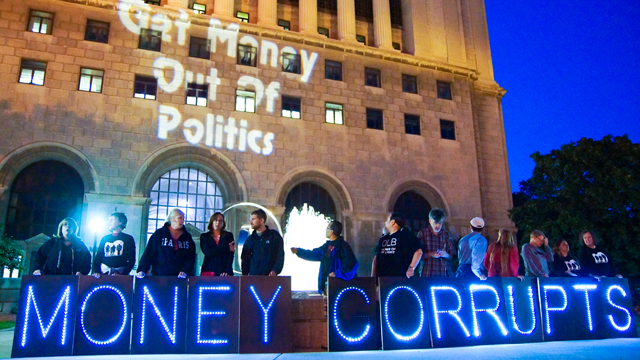This post first appeared at The Center for Public Integrity.

(Photo: Light Brigading/flickr CC 2.0)
Lawmakers in at least four states are considering a back-door way to dampen corporate political spending: Require shareholders to approve it.
State legislators in Maine, Maryland, New York and New Jersey have introduced bills that demand that a majority of shareholders approve corporate gifts to political committees or candidates.
Maryland’s bill is set to get a hearing from lawmakers this week. And more legislative buzz may be coming: The sponsor of the Maryland bill said he’s heard from about a dozen legislators from different states who are interested in the idea.
Supporters see the bills as a way to limit the influence of the landmark 2010 Supreme Court decision in Citizens United v. Federal Election Commission, which ruled corporations had a right to spend unlimited amounts of money calling for the election or defeat of candidates. The decision affected laws in about half the states.
Companies with deep pockets are now seen as major players in elections at all levels. Top-spending business and trade groups gave more than $48 million to races for state-level candidates in 2014, and more than $211 million to state-level ballot measure campaigns, according to two recent Center for Public Integrity analyses.
“The whole thesis of Citizens United is that the companies are just speaking for the shareholders,” said state Sen. Jamie Raskin, a Democrat who is sponsoring the bill in Maryland. “If this is going to be anything more than a cynical fiction, then state legislatures need to act to make it real.”
Raskin’s bill would require corporations to get shareholders’ approval for an annual political budget and a slate of candidates or committees the money would support. It would only apply to businesses incorporated in Maryland.
The Maryland Chamber of Commerce calls the idea impractical.
“The bill creates an unworkable scenario for corporations, to be forced to poll their shareholders when they want to make a decision like this,” said Matthew Palmer, senior vice president of government affairs for the chamber.
Raskin said he believes the idea behind his bill is gaining steam after The Washington Post and The Nation published columns he wrote supporting it, and after Congress failed to pass a constitutional amendment meant to overturn Citizens United last fall. About a dozen legislators in other parts of the US contacted him since the articles were published in October, he said, hoping to draft similar bills.
Maine Rep. Deane Rykerson, a Democrat, is among the imitators. His bill is modeled on Raskin’s. “This is not really a total rejection of Citizens United, but it’s a step on the way, temporarily anyway,” he said.
Rykerson’s bill would go one step further than Maryland’s — it would require corporations to give dissenting shareholders a pro-rated rebate for any political spending they don’t support.
“Shareholders can be subsidizing speech they find abhorrent through their stock ownership,” said Ciara Torres-Spelliscy, a fellow at the Brennan Center for Justice, a think tank that supports campaign finance reform.
Torres-Spelliscy commended the shareholder approach, pointing to similar laws in the United Kingdom. But she said that if campaign finance activists want widespread change they will eventually need Delaware to pass a shareholder-approval law, as most corporations in the US plant themselves there due to favorable tax laws.
In the past, campaign finance reformers have looked to activist shareholders to demand that corporations disclose political donations. They’ve also made an unsuccessful attempt to get the Securities and Exchange Commission to make companies reveal their political giving.
Many do voluntarily, but it’s not mandatory. Some of the nation’s largest companies voluntarily reported giving about $173 million to politically active nonprofits in roughly a single year, according to a Center for Public Integrity analysis last year.
Some states already have disclosure laws for corporate political giving, or require a corporation’s board to approve political contributions before a company can give. But no state has passed a law requiring shareholder approval, according to Torres-Spelliscy.
They may not succeed this year, either. A Hawaii senate committee already tabled a version of the bill introduced there in January. New Jersey’s and New York’s bills each have only one sponsor and have languished in committees since being introduced in recent months.
However, in Maine, Rykerson’s bill enjoys bipartisan support, with eight Democrats, two independents and one Republican lined up behind it.
“I think there’s a chance it will pass, and, if nothing else, it will raise awareness about the issue,” Rykerson said.
In Maryland, Raskin is hopeful, even though two incarnations of similar bills died in committee in prior years. The senator doesn’t consider newly elected Republican Gov. Larry Hogan an impossible obstacle, pointing out that he’s Maryland’s first governor elected after accepting public financing for his campaign, limiting his ability to raise money elsewhere. Raskin also said he met with the governor and discussed the idea.
“I think he has an open mind about campaign finance reform, so we’ll see,” Raskin said.
A spokesman for Hogan said the governor’s office would not comment on pending legislation.


